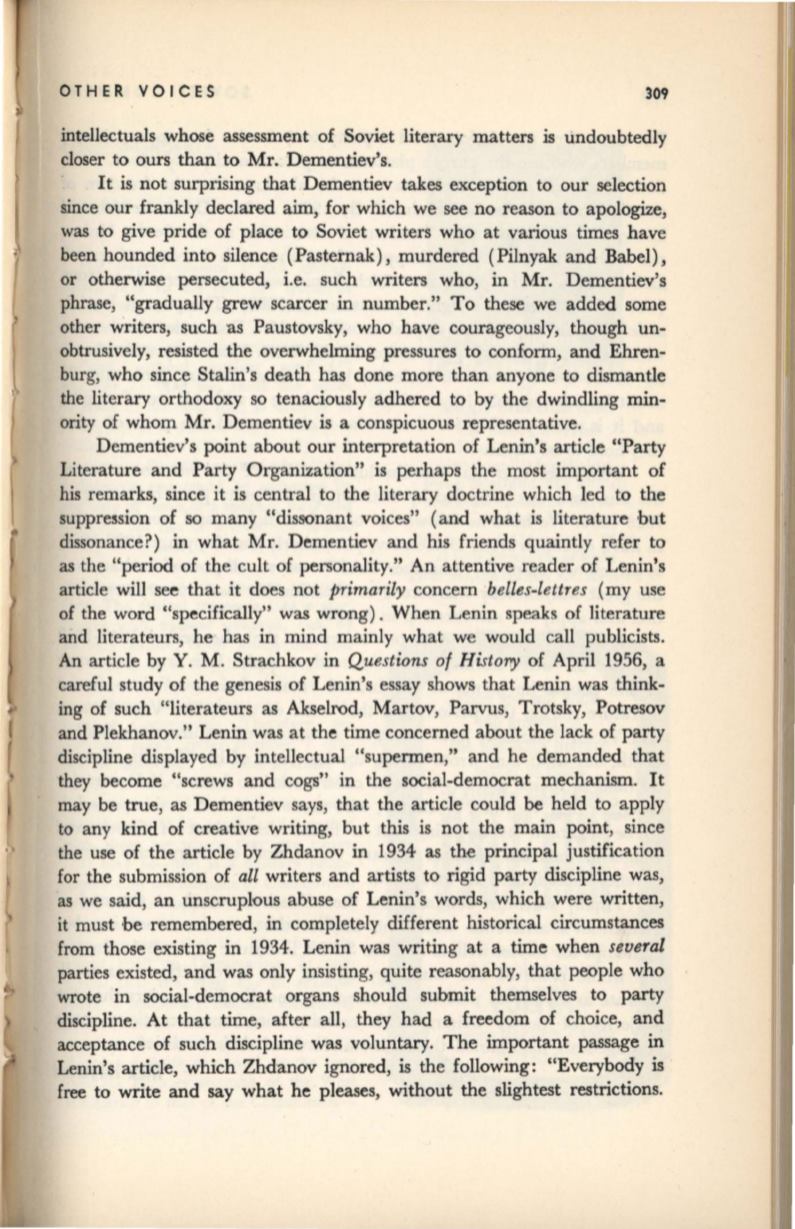
OTHER VOICES
309
intellectuals whose assessment of Soviet literary matters is undoubtedly
closer to ours
than
to Mr. Dementiev's.
It is not surprising that Dementiev takes exception to our selection
since our frankly declared aim, for which we see no reason to apologize,
was
to
give pride of place to Soviet writers who at various times have
been hounded into silence (Pasternak), murdered (Pilnyak and Babel),
or otherwise persecuted, i.e. such writers who, in Mr. Dementiev's
phrase, "gradually grew scarcer in number." To these we added some
other writers, such as Paustovsky, who have courageously, though un–
obtrusively, resisted the overwhelming pressures to conform, and Ehren–
burg, who since Stalin's death has done more than anyone to dismantle
the literary orthodoxy so tenaciously adhered to by the dwindling
min–
ority of whom Mr. Dementiev is a conspicuous representative.
Dementiev's point about our interpretation of Lenin's article "Party
Literature and Party Organization" is perhaps the most important of
his remarks, since it is central to the literary doctrine which led to the
suppression of so many "dissonant voices" (and what is literature but
dissonance?) in what Mr. Dementiev and his friends quaintly refer to
as the "period of the cult of personality." An attentive reader of Lenin's
article will see that it does not
primarily
concern
·belles-lettres
(my use
of the word "specifically" was wrong). When Lenin speaks of literature
and literateurs, he has in mind mainly what we would call publicists.
An
article by Y. M. Strachkov in
Questions of History
of April 1956, a
careful study of the genesis of Lenin's essay shows that Lenin was think–
ing of such "literateurs as Akselrod, Martov, Parvus, Trotsky, Potresov
and Plekhanov." Lenin was at the time concerned about the lack of party
discipline displayed by intellectual "supermen," and he demanded that
they become "screws and cogs" in the social-democrat mechanism.
It
may be true, as Dementiev says, that the article could
be
held to apply
to any kind of creative writing, but this is not the main point, since
the use of the article by Zhdanov in 1934 as the principal justification
for the submission of
all
writers and artists to rigid party discipline was,
as we said, an unscruplous abuse of Lenin's words, which were written,
it must
be
remembered, in completely different historical circumstances
from those existing in 1934. Lenin was writing at a time when
several
parties existed, and was only insisting, quite reasonably, that people who
wrote in social-democrat organs should submit themselves to party
discipline. At that time, after all, they had a freedom of choice, and
acceptance of such discipline was voluntary. The important passage in
Lenin's article, which Zhdanov ignored, is the following: "Everybody is
free to write and say what he pleases, without the slightest restrictions.


